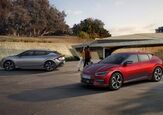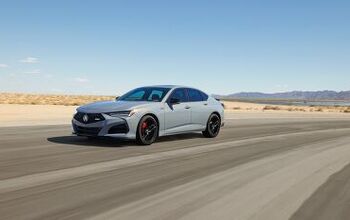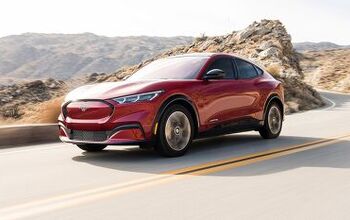Honda Exec: Chinese and Indian Automakers Could "Blow Up The Distribution Chain"
The prospect of US launches by Chinese and Indian auto brands like Tata and BYD have at least one of the established US-market players in a paranoid froth. Honda VP John Mendel revealed a few of the nightmare scenarios that keep him up at night to USA Today [UPDATE: more on Mendel’s fears at Automotive News [sub]]. One, inspired by BYD’s plans for a 2010 US launch without a distribution channel in place, is that newcomers could skip the dealer model altogether. Mendel worries that “warehouse stores or electronics stores” ( sound familiar?) could be used to cut dealers out of the loop, “blowing up” business-as-usual for US distribution strategy.
Mendel’s fear clearly owes something to the post-9/11 paranoia of asymmetrical warfare: a new enemy, exploiting its smaller size to wreak havoc on an already-fragile system. Happily for America and its fine car dealers, fears of such asymmetry are typically overplayed. An industry that lives and dies on volume isn’t likely to be dominated by a firm that rejects a large-scale, dedicated distribution network. A BYD could theoretically get a toehold by selling its EVs through some other retail chain, but there’s nothing in the history of the car game to suggest BYD could really become a Toyota-challenging global player (as it aims to) without securing a US dealer network.
Mendel’s second mania is based on a equally shrewd insight into the American psyche, specifically our love for all things disposable. Like his direct-marketing theory though, it takes the insight a little too far. The prospect of a US-market version of a Tata Nano has Mendel worried that Americans could become accustomed to the concept of a “disposable automobile,” to the detriment of established players like Honda. He quails:
If you’ve just spent a few thousand dollars on a car, and it needs repairs, maybe you won’t fix it. Maybe you’ll decide you want a new one in a different color, and just get another one.
Maybe. Or, maybe you’ll decide you’re tired of driving a Kei car and buy something that can go faster than 70 MPH. Besides, a US-market Nano would still cost well over $5,000, which is probably enough to discourage too much disposable car mania.
More by Edward Niedermeyer
Latest Car Reviews
Read moreLatest Product Reviews
Read moreRecent Comments
- AZFelix This article takes me back to racing electric slot cars with friends on tracks laid out in the basement. Periodically your car would stop due to lost connections or from flying off the track and you would have to dash over to it and set it right. In the mean time your competitor would race ahead until faced with a similar problem. It seemed like you were struggling harder to keep from losing than trying to win. Fun times.“History never repeats itself, but it does often rhyme.” Mark Twain
- MaintenanceCosts What Americans get told (a) vs. actual EV ownership experience (b)(and, yes, I am an actual EV owner)a. You'll be waiting indefinitely for slow chargersb. Nearly all of your charging happens while you're at your housea. EVs are prohibitively expensive toys for the richb. Fuel cost is 1/4 that of gas and maintenance about the same, with purchase price differences falling quicklya. EVs catch fire all the timeb. Rates of ICE vehicles catching fire are much higher, although the few EV fires can be harder to extinguisha. You can't take a road tripb. Road trips are a bit slower, but entirely possible as an occasional thinga. iTz A gOlF cArT!!1b. Like a normal car, but with nicer power delivery and less noise
- Pete Skimmel We bought a last year 2015 model XB as a leftover new car at our local Toyota dealer in early 2016. Stupidly cheap at about $18,500 out the door (no sales tax in Oregon), it has an automatic and the usual amenities. It's been a great around town car that my wife hopes to keep until they pry her cold senile hands from the steering wheel in about 20 years. When we occasionally carry adult passengers in the back seat they are always in awe at the space in this smaller vehicle. Now approaching 49k miles on the clock, our out of pocket costs have been wiper blades, a set of decent tires and routine oil changes that I do in the garage. It consumes zero oil between changes. Yes, it's an appliance, but a very serviceable one.
- Slavuta "The 4,861-pound curb weight" -- poor tires"on track, this application sounded pretty good" -- can they make it sound like Hemi?
- Slavuta Next time Poland will get to assemble Senior.BTW, reported today - companies leaving Poland, and not only IT

































Comments
Join the conversation
One problem any newfangled seller of automobiles faces is how to deal with the trade-in problem. I suppose they could simply sell all of their trades to CarMax or at auction though.
How wonderful wouldn't that be! Buy a car from anyone, anywhere, without having to worry about dealer this and dealer that. I can see American Honda, which is already stuck in idiotic contracts with politician sponsored (or was it the other way?) car dealers being a bit worried, though. For the rest of us, regulatory arbitrage is always a good thing, just as it was when the Japanese brands "circumvented" the UAW. As pertains to disposability, the more cars rely on rapidly changing and changeable electronics and software, the shorter their reasonably up to date shelf lives will become. And if necessary electronics becomes what's limiting cars' longevity, over engineering the mechanicals becomes simply a waste.